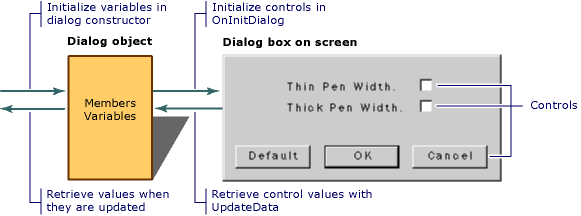Note
Access to this page requires authorization. You can try signing in or changing directories.
Access to this page requires authorization. You can try changing directories.
If you use the DDX mechanism, you set the initial values of the dialog object's member variables, typically in your OnInitDialog handler or the dialog constructor. Immediately before the dialog is displayed, the framework's DDX mechanism transfers the values of the member variables to the controls in the dialog box, where they appear when the dialog box itself appears in response to DoModal or Create. The default implementation of OnInitDialog in CDialog calls the UpdateData member function of class CWnd to initialize the controls in the dialog box.
The same mechanism transfers values from the controls to the member variables when the user clicks the OK button (or whenever you call the UpdateData member function with the argument TRUE). The dialog data validation mechanism validates any data items for which you specified validation rules.
The following figure illustrates dialog data exchange.

Dialog Data Exchange
UpdateData works in both directions, as specified by the BOOL parameter passed to it. To carry out the exchange, UpdateData sets up a CDataExchange object and calls your dialog class's override of CDialog's DoDataExchange member function. DoDataExchange takes an argument of type CDataExchange. The CDataExchange object passed to UpdateData represents the context of the exchange, defining such information as the direction of the exchange.
When you (or a Code wizard) override DoDataExchange, you specify a call to one DDX function per data member (control). Each DDX function knows how to exchange data in both directions based on the context supplied by the CDataExchange argument passed to your DoDataExchange by UpdateData.
MFC provides many DDX functions for different kinds of exchange. The following example shows a DoDataExchange override in which two DDX functions and one DDV function are called:
void CTestDialog::DoDataExchange(CDataExchange* pDX)
{
CDialog::DoDataExchange(pDX);
DDX_Check(pDX, IDC_MY_CHECKBOX, m_bVal);
DDX_Text(pDX, IDC_MY_TEXTBOX, m_strName);
DDV_MaxChars(pDX, m_strName, 20);
}
The DDX_ and DDV_ lines are a data map. The sample DDX and DDV functions shown are for a check-box control and an edit-box control, respectively.
If the user cancels a modal dialog box, the OnCancel member function terminates the dialog box and DoModal returns the value IDCANCEL. In that case, no data is exchanged between the dialog box and the dialog object.
See also
Dialog Data Exchange and Validation
Working with Dialog Boxes in MFC
Dialog Data Validation